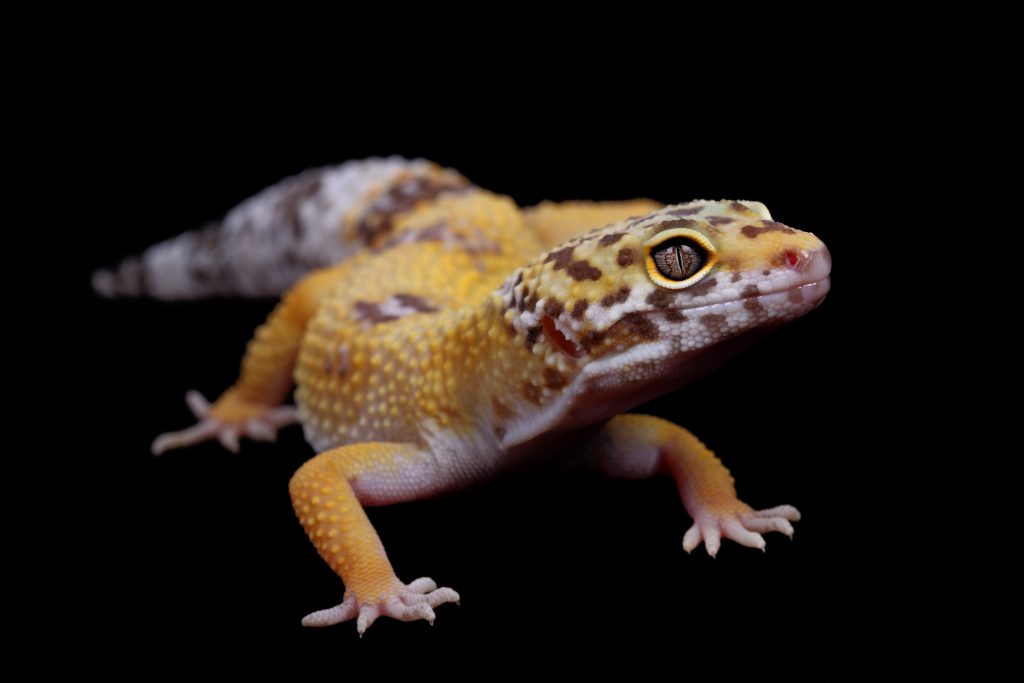How friendly are Leopard Geckos? These small, gentle lizards can become incredibly tame with regular, gentle handling. Let’s learn more…
Last updated on February 14th, 2023 at 11:52 am
Leopard Geckos are friendlier than many reptiles, in that they will eventually take food from your hand, and stay out in the open when you’re around. With time, they become tame pets that tolerate occasional handling well. Though they may bite when young, it happens less often as they get older.
In this article, we’ll take a look at how friendly they are, whether they recognize their owners, and what a Leopard Gecko bite feels like.
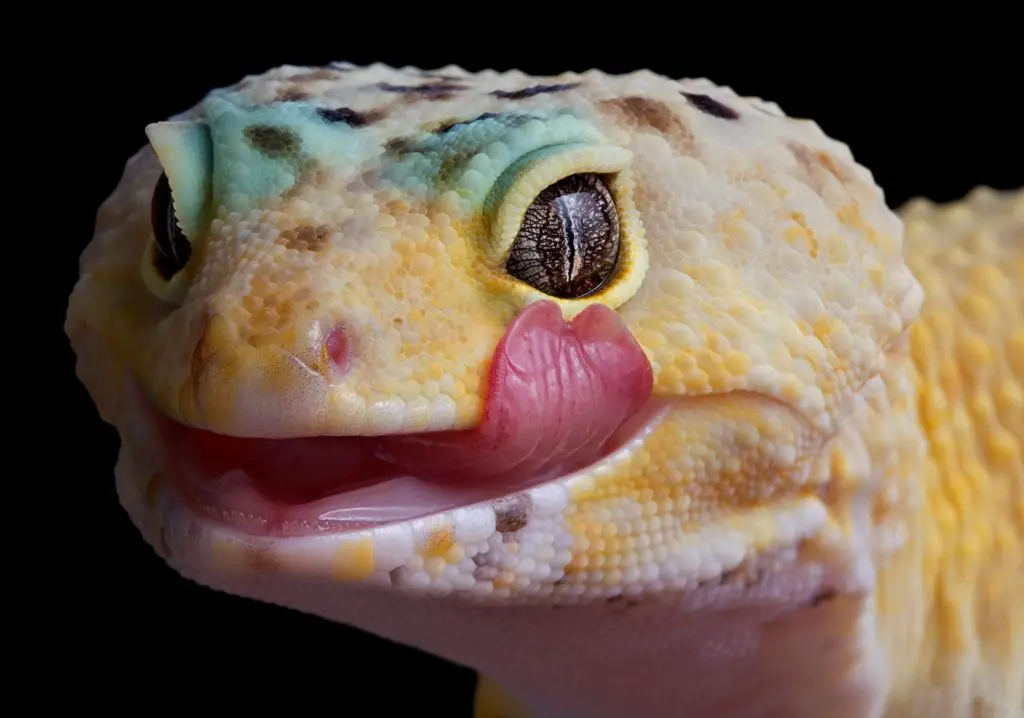
Are Leopard Geckos Fast?
Considering their size, Leopard Geckos are fast. It is estimated that a Leopard Gecko can run at the speed of 4-10 km/h. As they are only around 8 inches (20cm) long, this is the equivalent to a 6ft (1.8m) tall human running at 90kmph (55.92mph). *72/8 = 9. 9 x10 = 90km.
About sixty percent of geckos have sticky toe pads but not all. The Leopard Gecko is a species that belongs to the family Eublepharidae, which lacks the adhesive setae but instead has mobile eyelids. (In latin, Eublepharidae roughly means “the ones with complex eyelids”).
To survive in the wild, Leopard Geckos need to run fast to evade predators like foxes, snakes, and other small mammals. As they are poor climbers, running is their primary way to escape from predators. Without sticky toe pads, they have no way of scaling wales like Day Geckos or Moorish Geckos can.
Baby Leopard Geckos are more active and greatly rely on their speed for escape. As they grow old, the animals become calmer and are less inclined to run away at the first given chance. However, when feeling threatened or scared, any gecko will react quickly to get out of trouble.
Do Geckos Recognize Their Owners?
Leopard Geckos mostly associate things with their smell. Although their eyesight is good, they recognize their owners using their sense of smell.
Thus, when handling your Leopard Gecko it is important to maintain your natural scent. Do not cover it with perfumes, aromatic soaps, creams, and other products that may rob you of your natural smell.
Allow your gecko to get used to your smell and know that you are its friend and not an unknown intruder.
Not only do geckos recognize their owners with their scent but also friends and enemies, and foods. In the wild, these reptiles put their keen sense of smell to use when hunting for food or getting a warning of approaching predators.
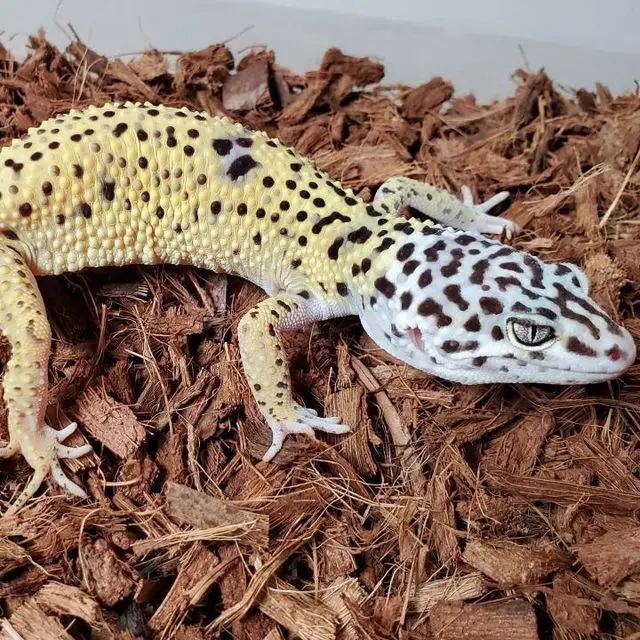
Do Leopard Geckos Bite?
Biting is an instinctive action for any animal with a mouth. Yes, Leopard Geckos do bite. However, their bites are usually not strong enough to penetrate human skin.
At times, their teeth may tear off some skin and scrape a little. But it is never a serious wound.
Geckos are gentle creatures. They are easygoing and will not harm you unless provoked or threatened. They may bite your fingers if hurt, or frightened.
Occasionally, pet owners may get bitten sometimes while hand-feeding their Leopard Gecko.
It is not that your pet lizard is aiming for your finger but while grabbing the tasty morsel from your hand. It may accidentally grab your finger with its tiny, sharp teeth.
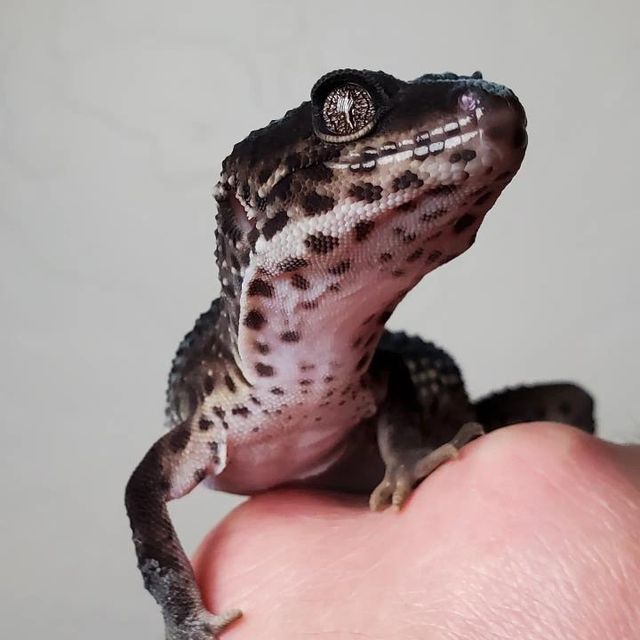
What Happens If Your Gecko Bites You?
Compared to several other lizard species, Leopard Geckos are gentle, friendly reptiles. Their teeth are sharp but very small. It’s mainly meant for gripping their food and not biting people.
Accidental bites do happen but they are minor. Gecko bites do not usually hurt. An adult gecko bite is like a pinch or a slight sting. Baby gecko bites do not hurt at all.
A Leopard Gecko’s teeth are not powerful enough to penetrate human skin easily. A gecko bite may leave a small scratch on the skin and rarely a puncture wound with a drop of blood oozing out.
However, in case of a bite, it is safer to wash the area with antibacterial soap to avoid any bacterial infection.

Why Do Geckos Lick You?
These lizards engage in a range of social and non-social behaviors that make them all the more fascinating to keep. They do different things to help them explore a thermal gradient, find food, or perceive possible threats.
The licking behaviour of Leopard Geckos is usually connected to smelling or tasting their environment. Licking you allows your reptile pet to understand your smell better and associate with you.
In the wild, this behaviour is seen when taking an account of their surroundings mostly during hunting, hiding, or searching for a mate.
Other than licking their owners, Leopard Geckos may display other licking behaviours like –
- Mouth Licking/ licking their food
- Lip licking
- Eye licking
- Licking after secretions to mark their territory
- During sickness or impaction
- Licking after shedding
- Licking to stay clean
It is normal for your pet Leopard Gecko to lick you and there is no need to get alarmed. If the licking behaviour seems odd, as in very excessive, watch the reptile closely and consult a professional to address the issue.
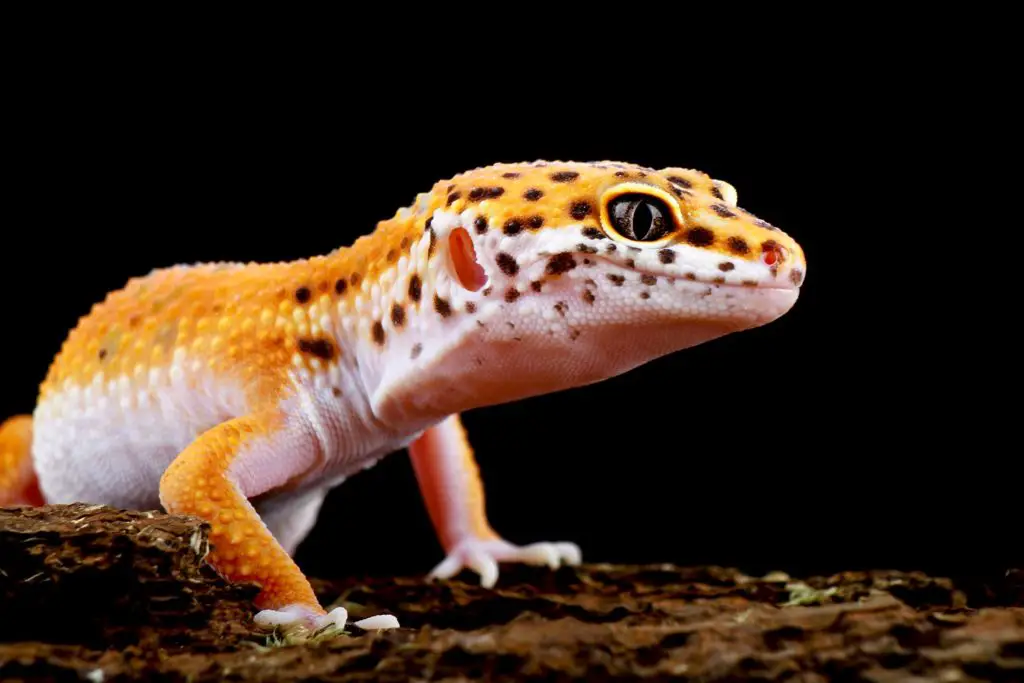
How Long Do Leopard Geckos Live?
Leopard Gecko lifespan varies from 8-32 years. The lifespan of pet geckos in captivity often depends on their different living conditions like food, breeding, temperature, moisture, general care, enclosure size, etc.
In general, a Leopard Gecko owner can expect the reptile to live for 10-15 years when provided with proper living conditions. You can read more about general Leopard Gecko care by checking out my Leopard Gecko husbandry guide.
As quick guide though, here are the main husbandry factors you must focus on for a long-lived gecko:
- heat
- humidity
- enclosure size
- diet
- vitamin/calcium supplementation
- hygiene
Are Leopard Geckos Poisonous?
Leopard Geckos are not poisonous. Even their flesh is not poisonous. They do not pose any threat to adults or even children.
However, handling a Leopard Gecko needs patience and expertise and is not an overnight process. Even if a leopard Gecko bites you there is nothing to worry about because there is no venom involved. They need calm, gentle handling to become completely tame.
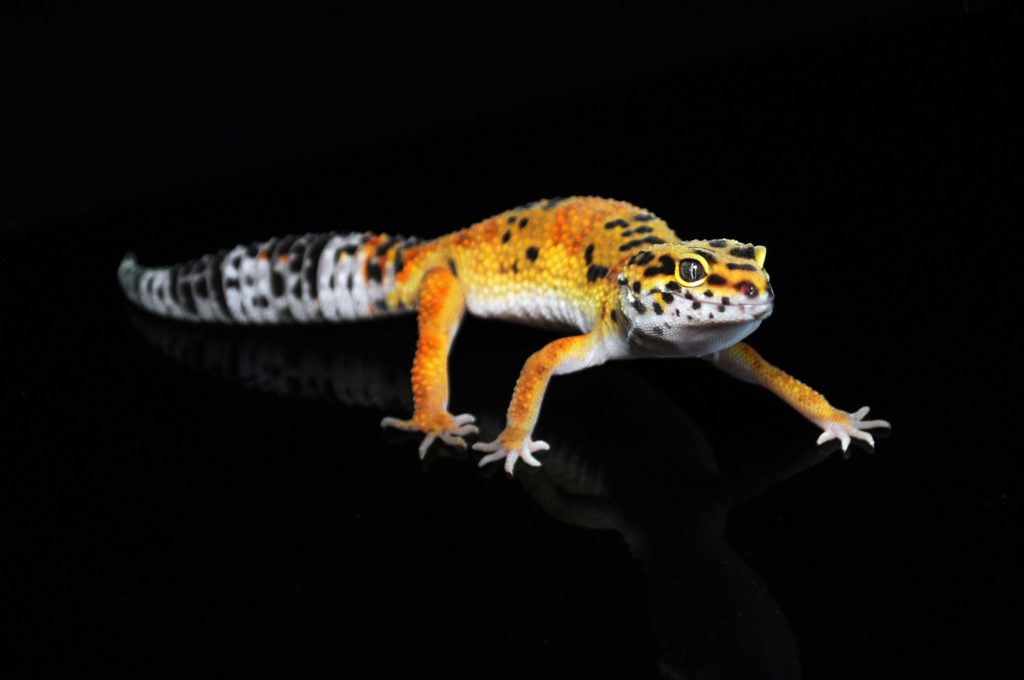
Are Leopard Geckos Smart?
Reptile intelligence is a mystery and the answer to this question is difficult to give in simple terms. Reptiles as a group are considered to be primitive animals that mostly survive by their wild instincts and not intelligence.
Not much research has been conducted on reptile intelligence and geckos cannot take an IQ test. Geckos do not rank high on the animal intelligence chart but are considered somewhat intelligent.
They do not exhibit extreme intelligence through their behaviour though. Among the most intelligent lizards, monitor lizards, tegus, and iguanas top the list.
In the case of pet Leopard Geckos, years of captivity also makes them rely less on their survival instincts, making them more docile. Additionally, Leopard geckos have poor depth perception and are not extremely aware of their surroundings.
They have reasonably good sight and hearing. Leopard Geckos are not too social and like to live solitary life. They would fight with others of their kind rather than live peacefully, exhibiting poor social intelligence.
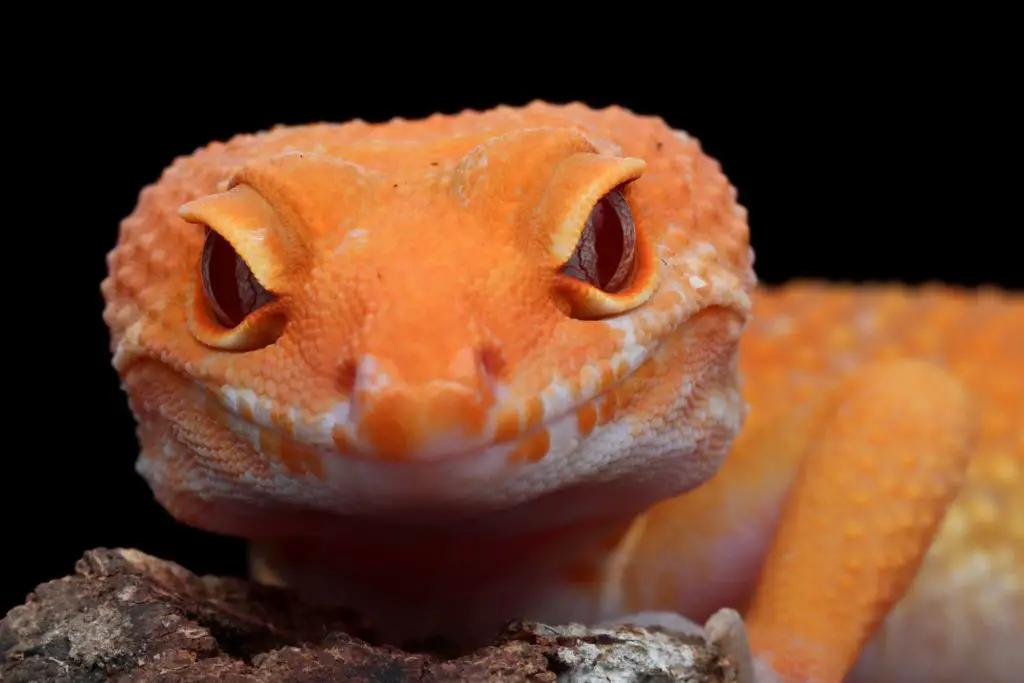
Do Leopard Geckos Get Attached to Their Owners?
Leopard Geckos are loners. They are not very social in the wild. Your pet Leopard Gecko mostly knows you by your smell and may not get attached to you like a cat or a dog.
However, with regular handling, the reptile may show a special bond with its owners. Hand feeding, enrichment activities, providing a healthy habitat, and proper care may make your Leopard Gecko connect better with you.
How Long Can a Leopard Gecko be Out of His Cage?
Leopard Geckos are fairly easy to maintain. However, they belong to dry, desert grasslands with hot and humid summers, and dry and cold winters.
Certain temperature and humidity conditions have to be maintained to provide them with a healthy life. Ideally, your leopard gecko will require a hot spot of around 90°F – 95°F (32°C – 35°C) with an ambient warm spot of about 85°F and a cooler side of around 75°F-80°F.
In case you are moving your Leopard Gecko from its cage, the temperature conditions should be kept in mind. Your reptile pet can be out of its den for about ten to twenty minutes at a time. This can be repeated once or twice a week even for a juvenile Leopard Gecko.
When taking your Leopard Gecko out of its enclosure it’s important to think of what constitutes a safe vs dangerous space for it, both in terms of temperature and hazards:
| Safe space | Dangerous space |
| – the room its enclosure is in | – any space where other pets like cats and dogs are present |
| – a room where you are the only person present | – open outdoor areas |
| – enclosed outdoor spaces where you can monitor it, and the temperature is warm enough | – cars or shops with air conditioning |
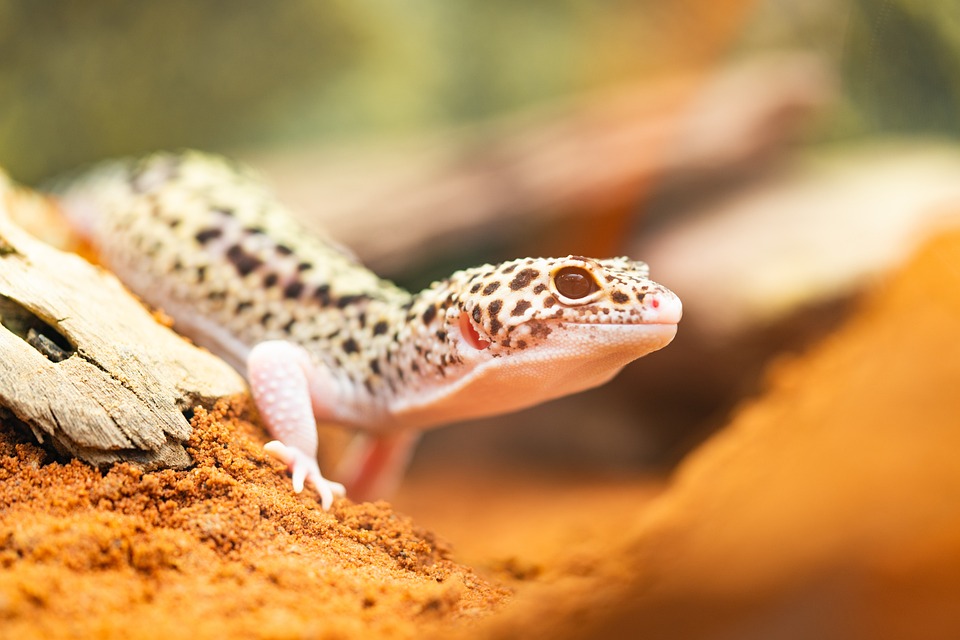
FAQ Relating to How Friendly are Leopard Geckos
Do leopard Geckos like to be Held?
For more than thirty years, Leopard Geckos have been kept as pets. Most of these reptiles are calm and easy to hold. However, that does not mean Leopard Geckos like to be held and petted like other pets like dogs and cats.
Every Leopard Gecko is different and reacts differently when held. Some geckos show more nervousness and may get fidgety and spunky when held.
A good way to eliminate this behavior is to try the ‘open-handed handling’ technique. Rather than grabbing the gecko from above, hold it in your palm. That makes the reptile feel less constricted and uneasy.
The better the holding experience for your Leopard Gecko, the more likely it is to allow you to hold it and behave well.
Are Leopard Geckos Friendly to Humans?
Leopard geckos are friendly reptiles with docile temperaments. However, a pet Leopard Gecko may take some time to warm up to its new environment and the owner. They are particularly good pets as they do not bite and are non-venomous.
There are things Leopard Gecko owners can do to form a bond with their pets:
- Handling your Leopard Gecko gently
- Hand feed to make yourself known
- Feeding your pet regularly
- Maintain a consistent routine
- Provide your gecko with all the basic needs such as humidity, heat and good diet
Can Leopard Geckos Be Affectionate?
A Leopard Gecko will never show its emotion as a dog does. However, your pet will know you by your scent and will associate you with positive experiences. So, don’t expect your Leopard to run toward you the moment it sees you. Even if it does, it may be associated with food.
If a Leopard Gecko has been brought up with love and care, individually in a tank, there are all possibilities for it to be friendly with its owner.
Can leopard Geckos Get Lonely?
Leopard Geckos in the wild live a solitary life and that’s what they like when in captivity too. So, Leopard Geckos do not get lonely. These reptiles are happy to live on their own rather than share their space with other geckos of their kind.
If you are thinking of getting your Leopard Gecko a partner to keep him company, that can be a bad idea. Leopard Geckos are not social and only spend time together for mating.
Forcing a Leopard Gecko to share its space with other members may cause stress. It is always safer to keep geckos individually in separate tanks.

